
Cause for concern
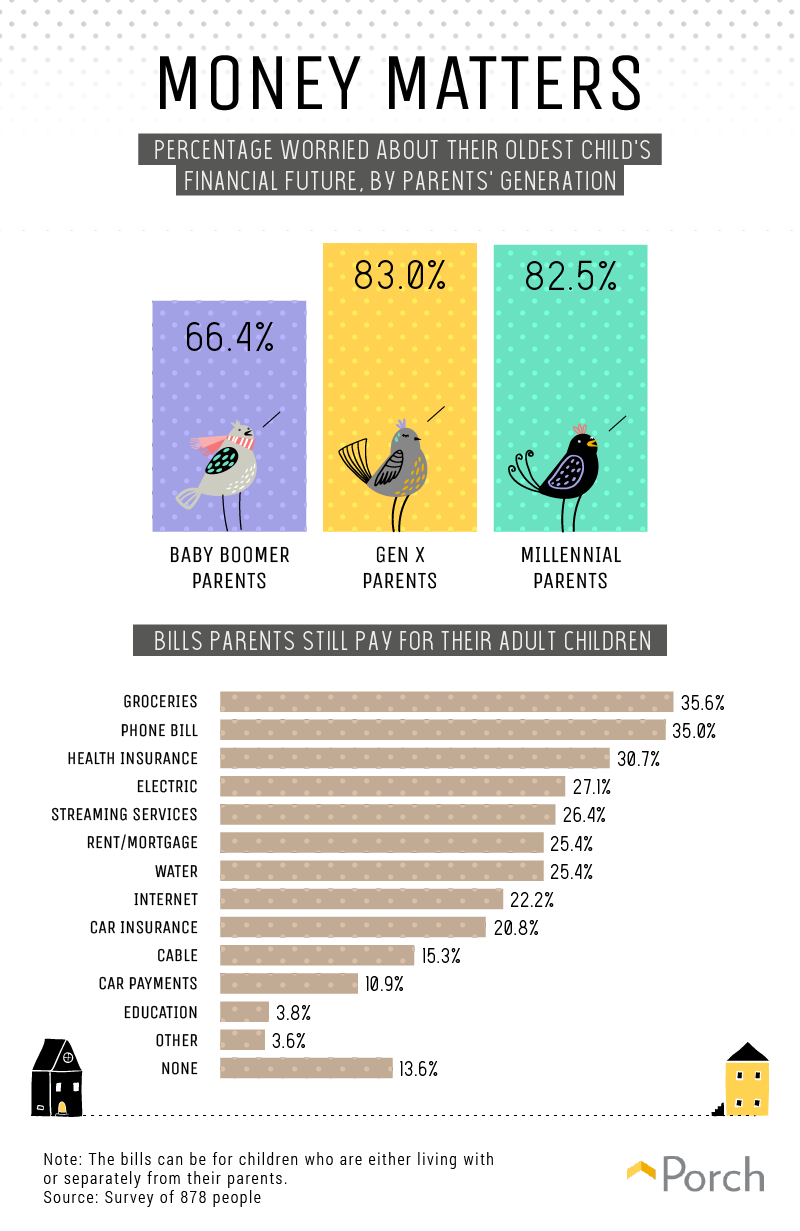 Worrying about your children is a natural part of parenthood. One study found the average parent spends as many as 37 hours each week thinking about the variety of things that could go wrong in their children’s life. While those sleepless nights aren’t uncommon, the concerns parents have for their children might be changing. Happiness and safety might still be at the top of the list, but parents are also increasingly worried about their children’s financial status. In fact, baby boomer parents were the least worried regarding their children’s finances (66 percent). However, over 82 percent each of Gen X and millennial parents said they worried about their children’s financial futures. That worry might cost them more than sleep, too. Nearly 36 percent of parents (even those with kids living elsewhere) still paid for their children’s groceries, followed by their phone bills (35 percent), health insurance (31 percent), electricity (27 percent), and streaming services (26 percent).
Worrying about your children is a natural part of parenthood. One study found the average parent spends as many as 37 hours each week thinking about the variety of things that could go wrong in their children’s life. While those sleepless nights aren’t uncommon, the concerns parents have for their children might be changing. Happiness and safety might still be at the top of the list, but parents are also increasingly worried about their children’s financial status. In fact, baby boomer parents were the least worried regarding their children’s finances (66 percent). However, over 82 percent each of Gen X and millennial parents said they worried about their children’s financial futures. That worry might cost them more than sleep, too. Nearly 36 percent of parents (even those with kids living elsewhere) still paid for their children’s groceries, followed by their phone bills (35 percent), health insurance (31 percent), electricity (27 percent), and streaming services (26 percent).
A range of emotions
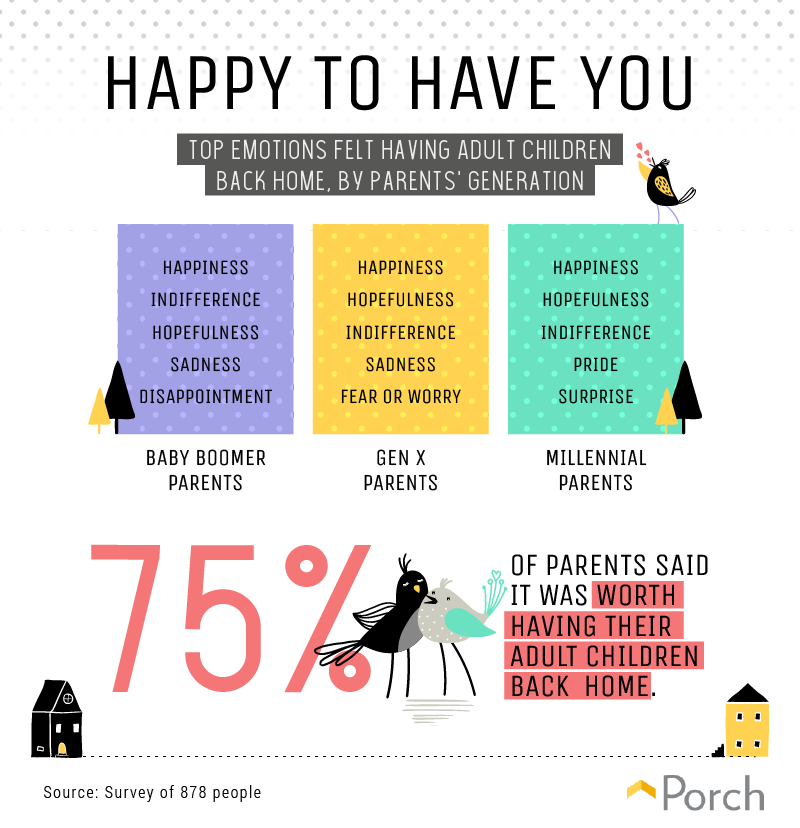 While moving back home with parents can provide a certain level of financial protection, research shows the experience isn’t always positive for young adults. Social norms suggest getting a home of one’s own is still a part of growing up, and going back to a childhood bedroom can negatively impact mental health. In some cases, this can trigger significant feelings of depression and failure. Parents may also experience a similar range of emotions. Three-quarters said the emotional rollercoaster was worth having a child home again, and parents of every generation expressed some combination of happiness, hopefulness, or indifference when a child moved back home. While positive and neutral emotions dominated their responses, it wasn’t uncommon for baby boomer and Gen X parents to feel saddened by having a child home again. Baby boomers also admitted to feeling disappointment, while some Gen X parents felt afraid or worried for their children.
While moving back home with parents can provide a certain level of financial protection, research shows the experience isn’t always positive for young adults. Social norms suggest getting a home of one’s own is still a part of growing up, and going back to a childhood bedroom can negatively impact mental health. In some cases, this can trigger significant feelings of depression and failure. Parents may also experience a similar range of emotions. Three-quarters said the emotional rollercoaster was worth having a child home again, and parents of every generation expressed some combination of happiness, hopefulness, or indifference when a child moved back home. While positive and neutral emotions dominated their responses, it wasn’t uncommon for baby boomer and Gen X parents to feel saddened by having a child home again. Baby boomers also admitted to feeling disappointment, while some Gen X parents felt afraid or worried for their children.
Pay up
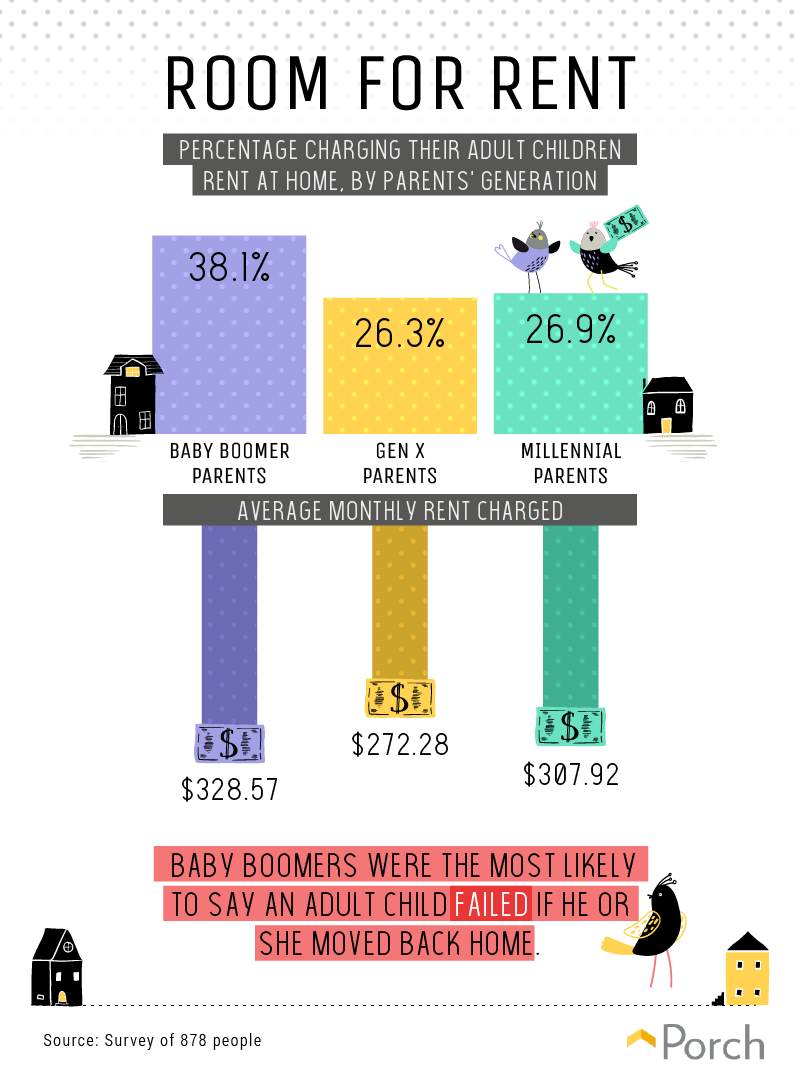 If yours is the case where your adult children have moved back home because they can’t afford to live on their own, is it ever appropriate to charge them rent? Some parents say yes. Around 38 percent of baby boomers and over 26 percent each of Gen X and millennial parents said they charged their adult children rent to live at home, ranging from $329 charged by baby boomers to $272 charged by Gen Xers (millennial parents were roughly in the middle). Experts suggest asking children to contribute to the cost of living can actually be a healthy exercise to remind them that budgeting is an important part of life (it can also prevent the burden of expense put on parents trying to lend a helping hand). Establishing these rules early can also help children coming back to the nest avoid the “boomerang” effect where they return after every failed attempt at living on their own.
If yours is the case where your adult children have moved back home because they can’t afford to live on their own, is it ever appropriate to charge them rent? Some parents say yes. Around 38 percent of baby boomers and over 26 percent each of Gen X and millennial parents said they charged their adult children rent to live at home, ranging from $329 charged by baby boomers to $272 charged by Gen Xers (millennial parents were roughly in the middle). Experts suggest asking children to contribute to the cost of living can actually be a healthy exercise to remind them that budgeting is an important part of life (it can also prevent the burden of expense put on parents trying to lend a helping hand). Establishing these rules early can also help children coming back to the nest avoid the “boomerang” effect where they return after every failed attempt at living on their own.
An expensive lesson
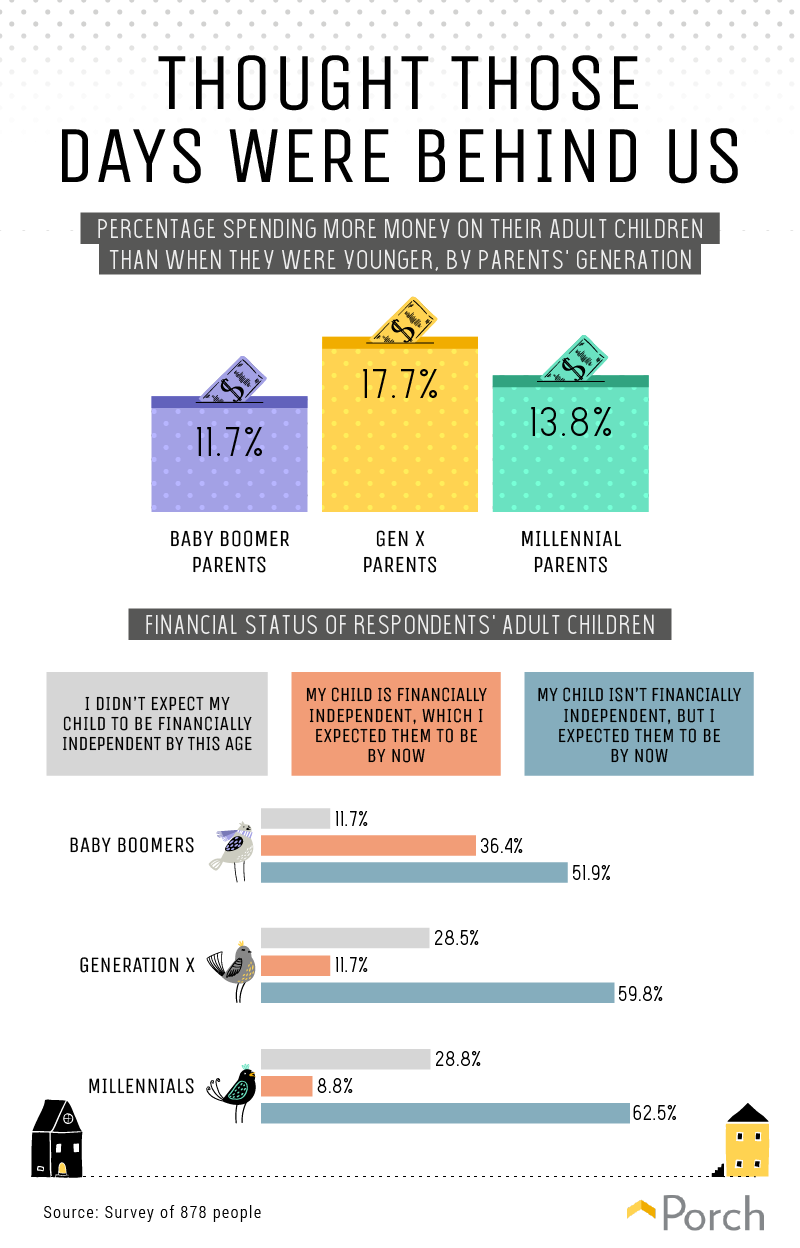 In a moment of need or crisis, parents may want to help their children in any way they can. But, as some financial planners warn, if that request becomes a long-term habit, it could cost both parent and child in the end. Paying their cellphone bill here or their car insurance there can add up, and when children move back home, those expenses can become excessive. Nearly 18 percent of Gen X parents said they spent more on their adult children than they did when they were adolescents. Almost 12 percent of baby boomers and 14 percent of millennials said the same. For some parents, however, this may be less of a surprise. Younger parents, including almost 29 percent each of Gen Xers and millennials, said they didn’t expect their children to be financially independent at this stage of their adult life. Additionally, less than 12 percent of Gen X parents and 9 percent of millennial parents said their children were financially independent, compared to 36 percent of baby boomers (perhaps because few millennial parents currently have adult children).
In a moment of need or crisis, parents may want to help their children in any way they can. But, as some financial planners warn, if that request becomes a long-term habit, it could cost both parent and child in the end. Paying their cellphone bill here or their car insurance there can add up, and when children move back home, those expenses can become excessive. Nearly 18 percent of Gen X parents said they spent more on their adult children than they did when they were adolescents. Almost 12 percent of baby boomers and 14 percent of millennials said the same. For some parents, however, this may be less of a surprise. Younger parents, including almost 29 percent each of Gen Xers and millennials, said they didn’t expect their children to be financially independent at this stage of their adult life. Additionally, less than 12 percent of Gen X parents and 9 percent of millennial parents said their children were financially independent, compared to 36 percent of baby boomers (perhaps because few millennial parents currently have adult children).
The boomerang effect
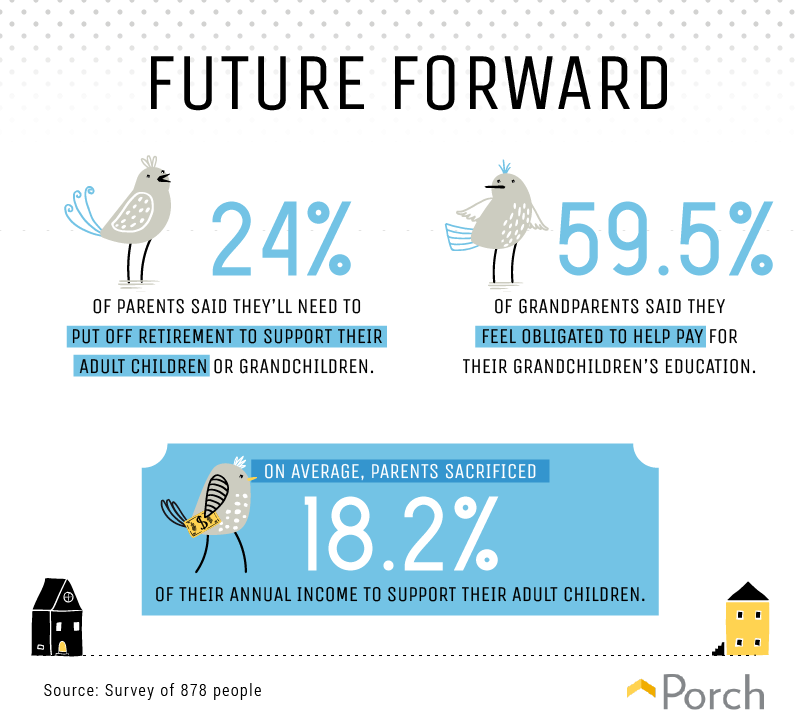 Parents aren’t the only caregivers experiencing personal strain as a result of their boomerang kids. In some cases, grandparents can bear the burden as well. Nearly 1 in 4 parents said they’ll need to put off retirement to support their adult children or grandchildren. Almost 60 percent of grandparents also felt obligated to pay for their grandchildren’s education costs. In total, parents acknowledged sacrificing around 18 percent of their annual income to support their adult children.
Parents aren’t the only caregivers experiencing personal strain as a result of their boomerang kids. In some cases, grandparents can bear the burden as well. Nearly 1 in 4 parents said they’ll need to put off retirement to support their adult children or grandchildren. Almost 60 percent of grandparents also felt obligated to pay for their grandchildren’s education costs. In total, parents acknowledged sacrificing around 18 percent of their annual income to support their adult children.
Conclusion
Even when parents and their adult children have found a living arrangement that’s mutually beneficial, it’s still likely to be frowned on. Just look at Michael B. Jordan, a star in Hollywood, who just happens to live with his parents. Even when he clarified that the home was purchased with the intention of giving his parents a place to live, Jordan still had to fend off criticism that he might somehow be mooching off them. As we found, it was far more common for parents of every age to feel happiness at having their adult children back home, even when hosting them cost more than raising them in adolescence. If you’ve suddenly found yourself hosting one more person than originally expected, let Porch help you make the most of your space. Whether you need help hanging a TV in a spare bedroom or turning your unfinished basement into a livable space, let us find the crew for the job. Our Porch Home Assistant will help you find local professionals to tackle everything on your home improvement to-do list. From painting and plumbing to electrical and landscaping, Porch has you covered. Visit us at Porch to learn more.
Methodology and limitations
The data in the above study were collected using a survey posted on Amazon’s Mechanical Turk service. This survey was made up of 878 respondents. 579 were women, 298 were men, and one chose to identify outside those. 214 were baby boomers, 564 were Gen Xers, 80 were millennials, and 20 were from generations outside those listed. To qualify for this survey, respondents had to have at least one child over the age of 18. The data presented in the above study rely on self-reporting, which can be host to issues like exaggeration. To ensure that the most accurate results possible were achieved, attention checks were presented throughout the data to make sure none of the respondents answered randomly.
Sources
- https://www.marketwatch.com/story/more-recent-graduates-are-living-at-home-than-ever-before-2018-05-08
- http://www.pewresearch.org/fact-tank/2017/05/05/its-becoming-more-common-for-young-adults-to-live-at-home-and-for-longer-stretches/
- https://nypost.com/2018/09/10/parents-spend-an-insane-amount-of-their-lives-worrying-about-their-kids/
- https://www.marketwatch.com/story/moving-back-in-with-your-parents-can-affect-your-mental-health-2018-11-21
- https://www.verywellfamily.com/should-you-charge-your-teen-rent-4106963
- https://www.independent.ie/life/family/would-you-charge-your-adult-children-rent-and-how-much-would-you-charge-36705874.html
- https://www.marketwatch.com/story/this-is-how-much-supporting-your-adult-kid-is-costing-both-of-you-2018-06-06
- https://www.theguardian.com/commentisfree/2018/feb/28/michael-b-jordan-live-with-parents-millennials-shame
Fair use statement
Have adult children living at home again? Feel free to share the results of this study with your audience for any noncommercial use. Like a good houseguest, we only ask for a link back to this page so that our contributors earn credit for their work.
